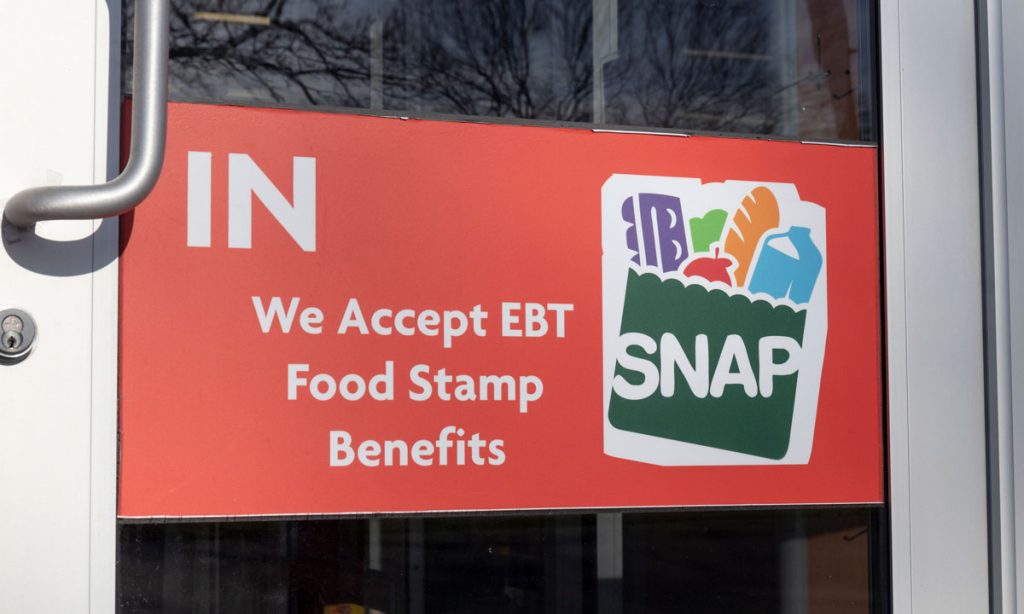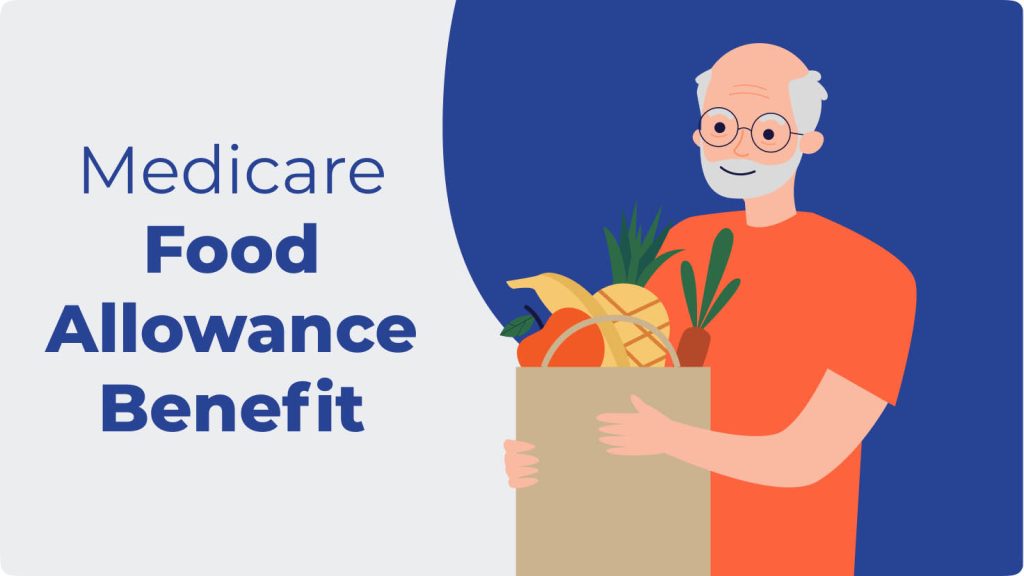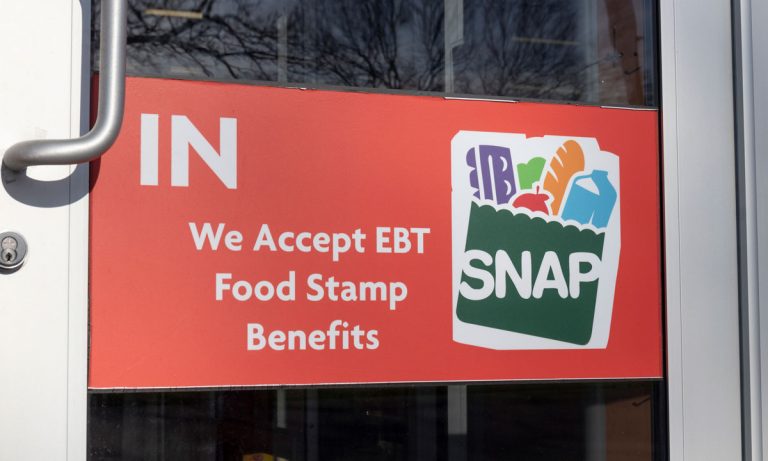Get Free Grocery Benefits Under Medicare
If you’ve been exploring free food allowance or free groceries, you might have come across the term “Medicare grocery benefit.” This benefit is a valuable allowance provided by some Medicare Advantage plans, helping you pay for healthy food and grocery items.
One notable benefit is the Medicare food allowance, which provides eligible individuals with grocery cards valued between $10 and $120 per month.
While Original Medicare doesn’t include this benefit, many Medicare Advantage plans, especially Special Needs Plans (SNPs), offer it to assist those with chronic conditions or specific health needs.
Eligibility for the Medicare grocery benefit can vary. It’s usually tied to certain Medicare Advantage plans, and you may need to meet specific criteria, such as being enrolled in both Medicare and Medicaid or having a chronic health condition. Understanding these requirements is crucial to determine if you’re qualified to receive this helpful allowance.
Applying for the Medicare grocery benefit often involves enrolling in an eligible Medicare Advantage plan that offers this feature. Once you’re enrolled, you typically receive a pre-loaded card to use at participating grocery stores. This card can be a significant help in managing your food budget, ensuring you have access to nutritious options that support your health.
What’s Included in the Medicare Food Allowance Benefit?
Various health plans now provide a healthy food card benefit to help you purchase nutritious items. You can typically use this card to buy:
- Fresh, canned, and frozen fruits
- Fresh, canned, and frozen vegetables
- Salad kits
- Dairy products
- Beans
- Healthy grains
- Meats
- Baking essentials like flour, seasonings, and sugar
- Nutrition shakes and snack bars
- Water and vitamin water
What’s Not Included in the Medicare Food Allowance Program?
The Medicare food allowance card does not cover all items. Excluded items often include:
- Pet food
- Baby formula
- Non-food items
- Chips
- Fresh baked goods
- Desserts
- Candy
- Soda
- Alcohol
- Tobacco
- Coffee shop items
Where Can You Use the Medicare Food Allowance Benefits?

The eligible grocery retailers where you can shop will depend on your specific Medicare Advantage plan and the state you reside in. Common participating stores may include:
- Walgreens
- CVS
- Kroger
- Walmart
- Food Lion
You should get specific details from your plan about which stores are c
What is Medicare?
Medicare is a federal health insurance program for those 65 or older and some younger individuals with specific disabilities. It also covers people with End-Stage Renal Disease.
Different Parts of Medicare
Medicare is split into several parts, each covering different services. Medicare Part A covers inpatient hospital care, skilled nursing facilities, and some home health care. There is usually no premium if you or your spouse paid Medicare taxes while working.
Medicare Part B involves medical insurance, covering doctor visits, outpatient care, and some preventive services. It generally has a monthly premium.
Medicare Part C, also known as Medicare Advantage, offers an alternative way to receive your Medicare benefits through private insurance companies. These plans often include additional benefits like vision, dental, and hearing.
Medicare Part D provides prescription drug coverage. This part helps lower the cost of medications, making it essential for those with high prescription costs.
Each part of Medicare offers unique benefits, ensuring comprehensive coverage for a wide range of medical needs. Understanding these parts helps you make informed decisions about your health care options.
Eligibility Criteria for Free Grocery Benefits
To be eligible for the Medicare Grocery Benefit, certain conditions and residency requirements must be met. This section will discuss these specific requirements.
Qualifying Conditions
You must have specific health conditions to qualify for the Medicare Grocery Benefit. These may include:
- Cancer: Those undergoing treatment may qualify.
- Diabetes: Includes both Type 1 and Type 2 diabetes.
- Hypertension: Commonly known as high blood pressure.
- Kidney Disease: Includes chronic kidney disease and end-stage renal disease.
- Obesity: Based on clinical diagnosis or BMI.
- Depression: Must be medically diagnosed.
Your Medicare Advantage plan will list qualifying conditions. Check your plan details or contact your provider for specifics.
Age and Residency Requirements
To be eligible, you typically need to be enrolled in a Medicare Advantage plan and meet age or residency criteria.
Age: Most beneficiaries must be 65 or older. Some exceptions exist for those with certain disabilities.
Residency: You must live in a service area where the plan is offered. Dual-eligibles (those on both Medicare and Medicaid) often qualify through special plans.
Verify your local regulations and plan requirements, as these can vary.
Enrollment Procedures

When enrolling in the Medicare Grocery Benefit, it’s important to understand the periods during which you can sign up, as well as the penalties you may face for late enrollment. Here’s what you need to know about initial and special enrollment periods, plus late enrollment penalties.
Initial Enrollment Period
The Initial Enrollment Period (IEP) is a seven-month window. It starts three months before the month you turn 65, includes your birthday month, and ends three months after.
To enroll during this period, contact your chosen Medicare Advantage plan provider directly.
Have your Medicare number and any necessary identification ready. Missing this window could delay your benefits.
Special Enrollment Periods
Special Enrollment Periods (SEPs) allow you to sign up or make changes outside the usual enrollment periods due to special circumstances.
Events like moving to a new area or losing other health coverage qualify you for an SEP.
To use an SEP, you must inform your Medicare Advantage plan provider. You’ll need documentation proving your qualifying event.
Late Enrollment Penalties
Failing to enroll during the IEP or an SEP may result in a penalty. This penalty can increase your monthly premiums.
The amount depends on how long you went without coverage. Contact your Medicare Advantage plan to calculate your specific penalty.
Penalties can be lifelong, so it’s best to enroll as soon as you’re eligible.
Medicare Grocery Benefit Overview
Medicare Grocery Benefit offers qualified enrollees funding for healthy food choices. Learn about what this benefit includes and the plans that offer it.
Benefit Summary
The Medicare Grocery Benefit provides funds pre-loaded onto a card for buying healthy food. You receive this benefit on a quarterly basis. The amount can vary widely, typically between $25 and $200 or more each month. It’s designed for those in Medicare Advantage plans, specifically Special Needs Plans (SNPs), which help cover costs for individuals with chronic conditions.
To use the benefit, you can shop at participating stores like Walmart, Walgreens, CVS, Kroger, and others. This helps ensure that you can access nutritious food even if mobility or health issues have made shopping difficult.
Plan Options with Grocery Benefit
The grocery benefit isn’t available in Original Medicare. It’s exclusive to certain Medicare Advantage plans. Special Needs Plans (SNPs) particularly feature this benefit. SNPs cater to individuals with specific diseases or characteristics, such as chronic illnesses or dual eligibility for Medicare and Medicaid.
You need to be enrolled in a health plan that offers the grocery allowance. Each plan has different eligibility requirements, often based on health conditions and income level. You should check with your Medicare Advantage plan provider to see if they include this benefit and ensure you meet the criteria.
How to Apply for Grocery Benefit
To apply for the Medicare Grocery Benefit, you must follow specific steps and provide necessary documentation. Ensuring you have the right information and paperwork will make the process smoother.
Application Process
First, confirm that your Medicare Advantage plan offers the grocery benefit. Not all plans provide this feature, so this is a crucial step. You can check your plan’s details on their official website or contact customer service.
Once confirmed, gather your health information. Certain qualifying health conditions may be required to apply for the benefit. Common conditions include diabetes, hypertension, and obesity.
Next, fill out the application provided by your health plan. This can usually be done online or through a mailed form. Make sure all sections are completed accurately to avoid delays in processing.
Some plans may require a consultation or verification from a healthcare provider. Be prepared to schedule an appointment if necessary.
Required Documentation
When applying, you will need to provide specific documents. These include proof of enrollment in a Medicare Advantage plan that offers the grocery benefit. You may need your plan ID card or enrollment confirmation letter.
In addition, have medical records or a doctor’s note ready. These should confirm your qualifying health conditions, such as diabetes or hypertension.
You might also need identification documents like a driver’s license or passport.
Prepare copies of all documents. This will ensure you have backups in case any items are lost or misplaced during the application process. Proper documentation is essential for a successful application.
Using Your Grocery Benefits
To use your Medicare grocery benefits, you need to activate them, shop at participating stores, and understand how to claim the benefit properly.
Benefit Activation
First, you need to activate the grocery benefit. You’ll typically receive a pre-loaded card or a specific type of voucher. Activation instructions often come with the card and might involve calling a dedicated phone number or visiting a website.
Make sure to follow these instructions carefully to ensure the benefit is ready to use. Check your card for activation status before heading to the store.
Participating Stores
Medicare grocery benefits are often limited to specific stores. These might include major grocery chains, certain local markets, and sometimes even online retailers. You should receive a list of participating stores with your benefit materials.
Using participating stores ensures that your purchases qualify for the benefit, so always shop within this list to avoid any issues at checkout.
Claiming the Benefit
When you’re ready to use your benefit, bring your pre-loaded card or voucher to a participating store. At checkout, inform the cashier that you’ll be using a Medicare grocery benefit. You might need to use the card just like a debit or credit card.
Make sure to keep track of your balance and any restrictions on what can be purchased, such as excluding non-food items or certain luxury groceries. Being aware of these details will help you make the most of your benefit.
Maximizing Your Benefits
To make the most of your Medicare Grocery Benefit, it’s important to understand how to use it effectively.
First, keep track of your balance. Knowing how much money you have left on your card helps you plan your shopping trips.
Second, make a list of eligible items. Focus on nutritious foods like fruits, vegetables, whole grains, and lean proteins.
Third, shop at participating stores. Not all grocery stores accept the Medicare Grocery Benefit card. Stores like Walmart, CVS, and Kroger are examples of potential participants. Check with your plan for a full list.
Consider using coupons and store promotions. Combining your benefits with discounts helps you stretch your budget further.
Lastly, keep an eye out for seasonal sales on fresh produce and pantry staples. This ensures you get the most value for your dollars.
By managing your balance, choosing healthy items, and shopping smartly, you can maximize the benefits provided by your Medicare Grocery Benefit.
Frequently Asked Questions
Understand who qualifies for the Medicare grocery allowance, how to apply, and the benefits included. Different plans like UnitedHealthcare and Humana have specific guidelines for using this benefit.
Who is eligible for the Medicare grocery allowance program?
Eligibility for the Medicare grocery allowance varies by plan and state. Normally, this benefit is offered through certain Medicare Advantage plans, especially Special Needs Plans (SNP). Qualification typically depends on criteria such as health conditions and financial status.
What steps are required to apply for the Medicare food allowance?
Applying for the Medicare food allowance involves checking eligibility, reviewing different Medicare Advantage plans, and enrolling in a plan that offers this benefit. It’s important to contact the specific plan provider for detailed application steps and requirements.
What benefits are included in the Medicare grocery benefit?
The Medicare grocery benefit usually includes a pre-loaded card with funds to buy nutritious foods such as fruits, vegetables, and dairy products. Some plans offer monthly or quarterly installments on a Flex Card, which can be used at participating stores.
How can I apply for the Medicare grocery allowance online?
To apply for the Medicare grocery allowance online, visit the website of the Medicare Advantage plan you are interested in. Follow their online application process, submit the required documents, and verify your eligibility. Assistance is often available through online chat or customer service.
What is the process for utilizing the UnitedHealthcare Medicare grocery benefit?
For UnitedHealthcare members, the grocery benefit might be provided on a prepaid debit card authorized for specific stores. Ensure you are enrolled in an eligible plan, activate the card, and use it at approved grocery stores for healthy food purchases.
Are Humana Medicare recipients entitled to a grocery allowance?
Humana Medicare Advantage plans may offer a grocery allowance, but this varies. Check with Humana to see if your specific plan includes this benefit. Conditions and eligible items can differ, so it’s important to confirm details with Humana directly.


